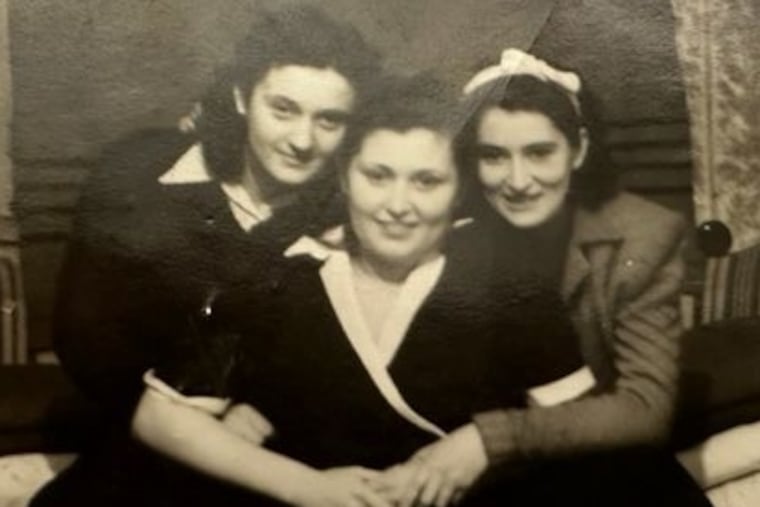My mom survived Auschwitz. She’s 96. We can’t let her story die with her
She is a Holocaust survivor, a community that is only getting smaller over time. We need to tell her story, to remind us what can happen — especially now, with antisemitism on the rise.

On Jan. 27 — International Holocaust Remembrance Day — it will be 78 years since the liberation of Auschwitz, the notorious concentration camp at which more than one million people were murdered by Nazis, the vast majority of whom were Jews. Only a small percentage of the people who entered Auschwitz survived.
One of them is my mother, Magda Bresnitz, who now lives in Lower Merion Township.
She’s 96, and one of fewer than an estimated 50,000 Holocaust survivors still alive in the United States, most over the age of 80. Approximately 900 of these survivors are in the Philadelphia area. For many, the recent rise of antisemitism is more than just an echo of a genocide long ago, but also a reminder that a history of hatred is destined to repeat itself. That reminder is more important now than ever.
» READ MORE: Antisemitism vs. anti-Semitism: Which is worse?
My mother was born Sept. 1, 1926, in Nyírbátor, Hungary. Thirteen years to the day later, Nazi Germany invaded Poland, starting World War II. She was one of the almost half a million Hungarian Jews arrested in the spring of 1944, forced into ghettos, then crammed into freight cars and transported to the Auschwitz/Birkenau concentration camps in Poland, where most were murdered.
How did some people manage to survive the Nazis’ Final Solution — in which millions of Jews (as well as political and war prisoners, LGBTQ people, and others) were brutally and systematically eliminated? What allowed people to survive the Nazis’ killing machine?
Youth, timing, intelligence, bravery, stamina, and help from sympathetic people were key factors. But more than anything, for most, it was just pure luck. This was true for my mother.
In early September 1944, my mother developed an infection while in Auschwitz and was examined by the notorious ”Angel of Death” camp doctor, Josef Mengele. He advised her that she needed a “rest,” a euphemism for sending prisoners to the gas chamber. Here, she had some luck: A group of prisoners, including my mother and her two older sisters, were transported by truck the next day to a satellite slave labor camp that did not have gas chambers.
She knows firsthand where antisemitism can lead.
In mid-January 1945, with the Russians rapidly advancing from the east, all the mobile prisoners from Auschwitz and its sub-camps were evacuated on long death marches heading toward Germany. Thousands froze or starved to death or were shot along the way. Somehow, my malnourished mother and her sisters survived and arrived in the Gross-Rosen concentration camp.
Then, in mid-February, survivors in Gross-Rosen were transported by train to the Bergen-Belsen concentration camp, the camp where Anne Frank was imprisoned and died. On the way, the train was bombed, killing many people. Again, luck: My mother and her sisters survived the bombing. That camp was their last stop as prisoners, before being liberated by the British in April 1945. Bergen-Belsen then became a camp for people who were displaced by the war. It’s where she met my father, also a survivor of the Holocaust, and where they were married in 1946.
My parents stayed at Bergen-Belsen while on immigration waiting lists. In 1948, they immigrated by ship to Canada; later, they came to the United States.
When I was young, my parents did not speak much about their experiences, but we had some books that illustrated the horrors. As the years passed, both of my parents somewhat reluctantly spoke more about what happened, their memories difficult to suppress.
My mother is frail and no longer hears or sees well, but she has a relatively sound mind. Fortunately, she has the personal resources to have a decent quality of life, with support from the Claims Conference (which helps survivors seek compensation) and through the Jewish Federation of Greater Philadelphia. She remains the last living member of our family who can bear witness to what happened during the Holocaust.
As I grew up, I gradually became aware of my parents’ history, but compared with the parents of many of my classmates, they seemed more like poor immigrants than survivors. As I grew older and my parents aged, I noted more incidents of antisemitism, so read more about the Holocaust and asked my parents questions. Over time, I belatedly felt the weight of my generation’s responsibility to pass on what we’ve learned about our history. My first cousins and I have shared our parents’ stories with our younger family members. One of my sons, as a teenager, recorded an emotional interview with my father about his Holocaust experience.
I challenge any person who denies the Holocaust took place to speak to my mother or any other survivor.
Her family, including her sisters, are long gone. My father died in 2000, but while he was alive, he was haunted by the memories of his murdered relatives. My mother has dealt with her memories with less angst, but when there are news stories about incidents of antisemitic actions and hate crimes, she will get concerned, and want to talk.
Her concerns are not misplaced. She knows firsthand where antisemitism can lead.
We need her stories, as well as those of the few survivors who remain. And it’s up to those of us still living to keep telling the stories of those who have died, to remind us what can happen, even in a democracy.
Eddy A. Bresnitz is a physician and former deputy commissioner for Public Health Services in the New Jersey Department of Health. dreddybres@gmail.com